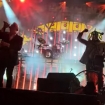"Once you release an album, you're a product," Tool frontman Maynard James Keenan told Hit Parader in July 2001, two months after the release of the band's third prog-metal opus, Lateralus. "That's a fact of life. You can deny it to yourself, but deep down you know it's true. I heard fans say we sold out when the last albums became successful. I had to agree with them. We are a product. But we're also true to what we believe."
By the early 2000s, Tool were as much a brand as a band, cultivating an aura of mystery, darkness and sophistication — through their purposeful lack of promotion, their brooding videos, their elaborate time-signatures, their elliptical lyrical references — that transcended their actual music. If you liked Tool, you were as likely to love metaphysics as Meshuggah. But Lateralus proved that, for all their grandiosity as a product, their music had continued to evolve. No one sounded like Tool because no one could.
The album arrived at a crucial moment — five years after the game-changing Ænima and one year after Keenan's debut LP with A Perfect Circle. But the wait — which Tool fans have learned to accept as a way of life — was worth it. Below, we highlight some of the album's most intriguing details and stories.
1. Lateralus is 78 minutes and 51 seconds long, making it — by default, considering that most discs max out at 80 minutes — one of the longest single CDs ever recorded. Somehow, though, Tool still left music on the cutting room floor.
Producer David Bottrill told the Salival site in 2013, "On Lateralus, I helped more with the structure of some of the songs. I remember campaigning to lose a section of the song 'Lateralus' that Danny liked a lot. I think he still is a little sorry it didn't make it into the song."
2. The terrifying instrumental piece "Faaip de Oiad" is, in trademark Tool style, filled with Easter Eggs and obscure allusions for fans who are willing to dig
The song itself blends white noise with distorted drums and a man's feverish rants about "extradimensional beings" — the latter sampled from a 1997 call into Art Bell's Coast to Coast AM radio show.
During the infamous recording, the caller claims to be a former employee of Area 51 and panics audibly that his message is being "[triangulated]." According to legend, the satellite carrying the feed died during the broadcast, and someone claiming to be the caller later admitted that he fabricated the tale.
"Who knows if he was speaking from a rational state, is really panicked or is a complete schizophrenic who completely lost it?" drummer Danny Carey told Modern Drummer in June 2001. "We may never know."
Instead of just titling the track "Area 51" or something obvious, Tool added another mystical layer. "Faaip de Oiad" translates to "The Voice of God" in Enochian, an angelic language documented by Renaissance-era British occult philosopher John Dee and his self-described "spirit medium" colleague Edward Kelley.
3. Tool, always way funnier than anyone gives them credit for, have never been shy to fuck around with their fans. During the preceding hype for Lateralus, they teased a fake album title and track list.
The beauty of the gag is that major news outlets picked up the goofy names and ran with them. Just take this ABC News blurb: "Tool, in the final stages of tinkering with its new album, has unveiled a title for the long-awaited LP: Systema Encéphale.
According to the band's Web site (toolband.com), the follow-up to 1996's Ænima will include 'Malfeasance,' 'U.V.R.,' 'Numbereft,' 'Encephatalis,' 'Mummery,' 'Coeliacus,' 'Pain Canal,' 'Lactation,' 'Smyrma,' and 'Riverchrist.'"
Fucking "Pain Canal"? "Riverchrist"? If you fell for that one, you had it coming.
4. Tool fans and other pranksters helped the spread of Lateralus disinformation before the album release
Back in the Wild West days of Napster leaks, numerous fake tracks circulated online — to the point where fan sites were forced to play referee. One imposter track was reportedly called "Prove It," which turned out to be Chevelle's "Prove to You."
5. A badass factoid that many Tool fans regard with Biblical importance, some of the lyrics from "Lateralus," if charted syllabically, follow the numeric pattern of Italian mathematician Leonardo of Pisa's famed Fibonacci Sequence
Let's untangle this a bit: In the sequence — which correlates with the "Golden Ratio," a pattern that appears throughout nature — each number equals the sum of the previous two. The 16th number in the sequence is 987 (1, 1, 1, 2, 3, 5, 8, 13, 21, 34, 55, 89, 144, 233, 377, 610, 987).
During the writing process, bassist Justin Chancellor brought in a riff that, after some workshopping, evolved into measures of 9, 8 and 7. "Danny saw it had a connection to the Fibonacci, so he started trying to work in elements of it," guitarist Adam Jones told Kerrang! in 2015 of the song, which they originally titled "987."
"Then Maynard came in and we started telling him about the sequence. It came from trying to relate to those things in life or nature we all have in common ... It's something that people have been studying since the beginning of time. So we wanted to apply that to our music — that's why we got more into the idea behind science, metaphysics and the myth of communication."
Keenan then built some of his lyrics around the sequence, using words with syllables climbing from numbers one through six and back down — in a haiku-like structure: "Black" (1) "then" (1) "white are" (2) "all I see" (3) "in my infancy" (5) "red and yellow then came to be" (8) "reaching out to me" (5) "let me see" (3).
It's a nifty feat of verbal symmetry, but Keenan regrets the approach. "I feel like I kinda pulled a very pedestrian, sophomoric move by including those numbers in there because, in general, music is the Phi [or Golden] ratio," he told Joe Rogan in 2017.
"All nature, all these things we're talking about, it's already here. By pointing it out, staring at it and pointing at it with those numbers present, and the way the numbers and lyrics are — I feel it's good to let people know about it, but I almost feel like it was kind of a dick joke in a way. I could do better."
6. Tool layered lots of weird shit into the mix — including the electrical crackling from a "Jacob's Ladder" transformer — as they indulged in the studio. Much of the experimentation was Carey's territory.
"I also had a piano that was destroyed. I got some good samples from that, banging on the strings for 'Resolution,'" he told Modern Drummer. "I liked some didgeridoo samples, and a lot of found-sound stuff. The Tibetan monk sounds you hear on the record are just me growling through a tube.
"That was the initial sample, and then I overdubbed an Oberheim through a Vocoder. Before this record, we were really rigid about being able to perform every note live, but we got away from that for this one. Maynard is doing more harmonies and doubling on his voices, and Adam did more guitar overdubs."
According to the Toolshed fan site, Keenan once noted that the ambient interlude "Mantra" is the slowed-down sound of him squeezing his Siamese cat. Given Tool's love of saying weird shit in interviews, it's best to take that one with a grain of salt. (Perhaps on a future reissue, we'll hear an extended cut of Keenan's cat-squeezing.)
7. The album title is something of a dual reference, nodding to both the thigh muscle vastus lateralis and the concept of "lateral thinking"
"[Lateralis] itself is actually a muscle, and although the title does have something to do with the muscle, it's more about lateral thinking and how the only way to really evolve as an artist — or as a human, I think — is to start trying to think outside of the lines and push your boundaries," Keenan told Aggro Active in May 2001.
"Kind of take yourself where you haven't been and put yourself in different shoes; all of those clichés."
8. Oh, the good ol' days when a five-year interim between Tool albums felt like a summer vacation ... The frustrating delay between Ænima and Lateralus was partly due to forces outside of the band's control
In 1997, Tool's former label Volcano Records filed suit against the band, citing a "wrongful attempt" on the quartet's part "to abandon its exclusive recording contract." The group then filed its own complaint, claiming their contract was never renewed and they were free to pursue other options.
(Tool became involved in another lengthy legal battle in 2007, this time involving artwork and an insurance company, and that insane headache only slowed down their progress on the most highly anticipated heavy music LP of all time.)
"People always ask us why it took so long to record," Jones told Guitar World in June 2001. "But we didn't take four years to record. First, we toured for a couple years behind Ænima. Then we did Ozzfest, and then Maynard did his work with his side group, A Perfect Circle. So we really did this album in about a year, which in my mind is pretty good.
"But you know what?" he continued, "That's not entirely accurate. There were a lot of little things that got in the way of us completing the record on time. I think [everything] that could have gone wrong with this album did, from little things like broken gear to bigger issues like getting involved in a lawsuit with our label.
"I was telling the band as we got on a plane to go to the mastering studio in Maine that I wouldn't be surprised if we crashed."
"It was kind of hard to keep being creative," Chancellor told MTV2 that same year. "It kind of grated a bit. And we had to get through that a little bit before we could get back to the creative process."
9. It's easy to forget that Lateralus came out just four months before the horrors of 9/11. Tool performed live just two days after the terrorist attack in Grand Rapids, Michigan — and Keenan admitted they were "finding it very difficult to concentrate."
"I have a suggestion for you: Take the feelings you've experienced in the last few days and hang on to them, good or bad, and please create something positive with them," he told the crowd, according to The Grand Rapids Press' live review.
"Hopefully, tonight has been somewhat of a soundtrack for healing," he added. "Because there's certainly going to be a lot more pain in the coming years."
That same month, the band made their debut at New York City's Madison Square Garden — but the specter of 9/11, quite naturally, hung over the show. "It's going to be very heavy playing there in light of the World Trade Center tragedy," Chancellor told The Record.
"We're still stunned by what happened, just like everybody else is. It was horrible, but we have to heal. We're just a band, but if we can just take someone away from all of that and they can smile for a little bit because of us, we've done something worthwhile."
10. "Schism" beat out Black Sabbath, Slayer, Slipknot and System of a Down for the 2002 "Best Metal Performance" Grammy Award. The best part, though, is that Carey playfully thanked the Prince of Darkness onstage during their acceptance speech.
"Thanks to my parents for putting up with me, and I want to thank Satan," the drummer joked, according to MTV. Meanwhile, Chancellor saluted his dad "for doing [his] mom." Tool: heavy, trippy and classy.
Below, watch Maynard James Keenan train in Brazilian Jiu-Jitsu and discuss how fighting connects to his philosophy of life and creativity:












